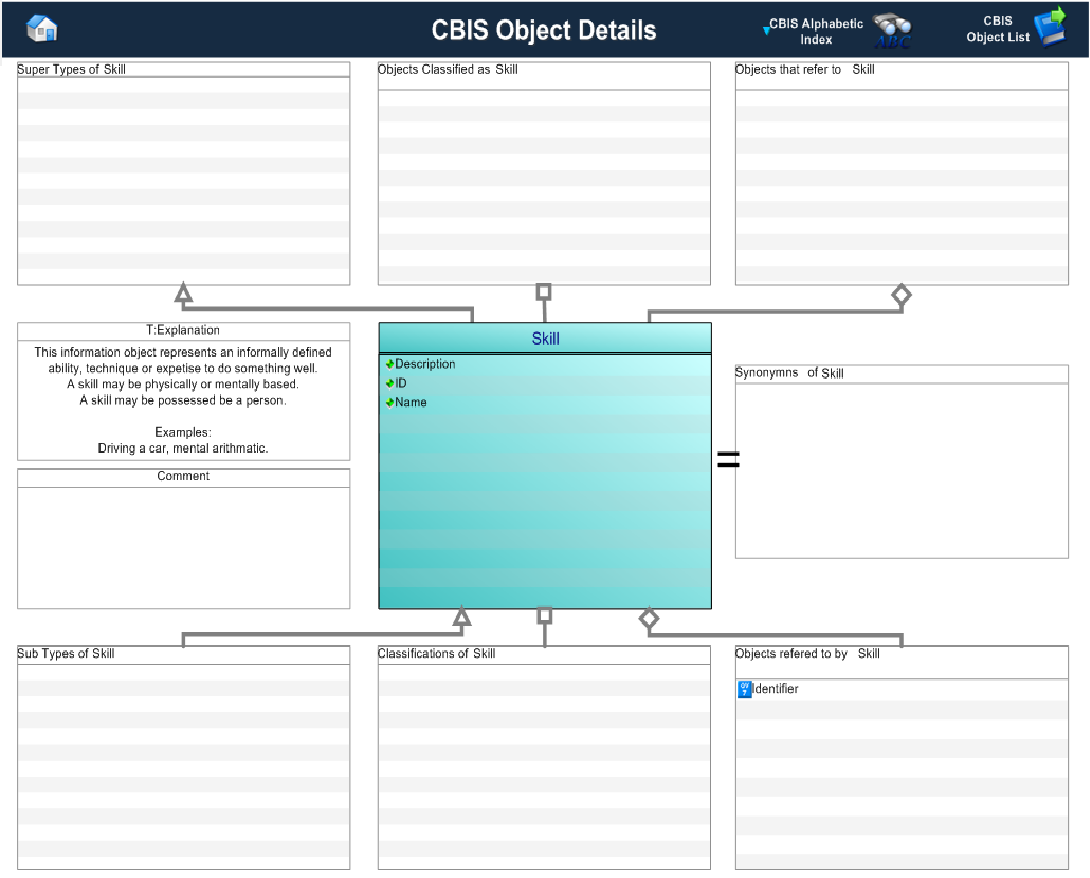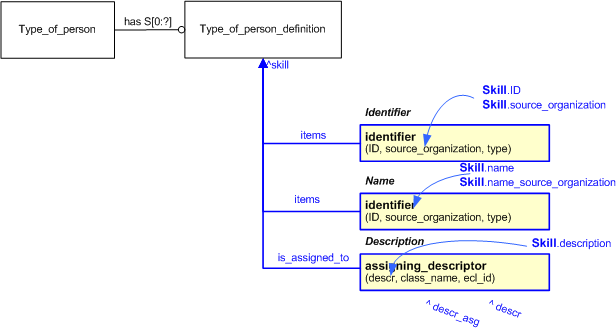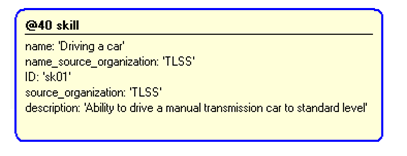Template:— skill (skill)
Context:— UK_Defence |
Date: 2009/11/03 15:57:52
Revision: 1.4
|
This section specifies the template skill.
NOTE
The template has been defined in the context of
UK_Defence.
Refer to the business context for details of related templates.
NOTE
An explanation of a template and the associated instantiation path is
provided in the
Template overview
section.
This template describes how to represent UK_Defence skill using
Type_of_person_definition.
This represents an informally defined ability, technique or expertise to do something well.
A skill may be physically or mentally based.
A skill may be possessed be a person.
Examples:
Driving a car, mental arithmetic.
For further information about the representation of a skill, see below.
The skill business object is used by those UK_Defence Data Exchange
Specifications that require information about an informally defined ability,
technique or expertise to do something well.
Figure 1 — Graphical Representation for Business Object skill
The definition of a skill object is:
Data about an informally defined ability, technique or expertise to do something well.
|
Attribute name
|
Attribute description
|
Attribute type
|
Optionality
|
| Description |
This is the description of the skill. |
Intrinsic |
Mandatory |
| ID |
This is the identifier of the skill. |
Identifier |
Mandatory |
| Name |
This is the name of the skill. |
Intrinsic |
Mandatory |
Table 1 — skill attribute details
The EXPRESS-G diagram in
Figure
2
shows the templates and EXPRESS entities that are required
to represent the template
"skill".
The text highlighted in blue shows the template parameters.
Figure 2 — An EXPRESS-G representation of the Information model for skill
The graphic for the template to be used in other EXPRESS-G diagrams
is shown in Figure
3
below.
Figure 3 — The graphical representation of the skill template
The following input parameters are defined for this template:
The identifier of the organization responsible for the name of the skill.
The identifier of the skill.
The identifier of the organization responsible for identifying the skill.
The description of the skill.
The following reference parameters are defined for this template:
Allow the
Type_of_person
entity instantiated in this path to be referenced when this template is used.
Note: The
Type_of_person
entity can be referenced in a template path by:
%^target = $skill.type_of_person%
The following parameter combinations specify a uniqueness constraint:
Unique constraint: Unique skill
Each instance of the
entity
(
Type_of_person_definition)
within the data set shall be uniquely identified
by a combination of the following parameters on this
template (skill) namely:
ID,
source_organization.
The
instance is
referenced by the following template parameter:
skill.
Any given identifier shall only be assigned to a skill once.
The instantiation path shown below specifies the entities that are to be
instantiated by the template.
A description of templates and the syntax for the instantiation path is
provided in the
Templates Help/Information section.
The following entities are instantiated with attributes as specified:
The instance diagram in Figure
4
shows an example of the EXPRESS entities and templates that are instantiated by the template:
/skill(ID='sk01', source_organization='UK_Defence', name='Driving a car', name_source_organization='UK_Defence', description='Ability to drive a manual transmission car to standard level')/
(an illustration of the consolidated skill template is shown in
Figure
5 below.)
Figure 4 — Entities instantiated by skill template
The instance diagram in
Figure
5
shows the graphic symbol for the template that is to be
used in other instance diagrams. The example template is:
/skill(ID='sk01', source_organization='UK_Defence', name='Driving a car', name_source_organization='UK_Defence', description='Ability to drive a manual transmission car to standard level')/
Figure 5 — Instantiation of skill template
Characterizations
No common characterizations of the template
skill
have been identified. However, the ISO 10303-239 EXPRESS model
may enable other assignments to the entities instantiated by the template.




